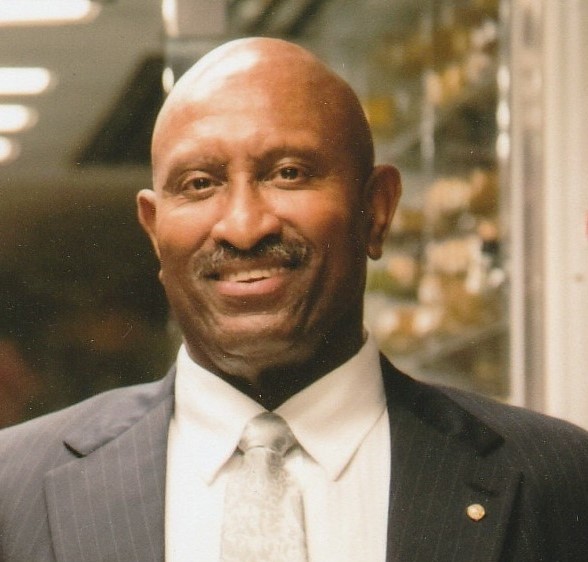Terrance Hunter returns to inspire inmates with his story of redemption
By Dave Eshleman
 When Morgan Hill resident Terrance Hunter heard the metal doors at San Quentin Prison’s checkpoint close behind him a little more than a year ago, it was a familiar sound — one he had heard many times before. Terrance had spent half his life behind bars, and now he was going back.
When Morgan Hill resident Terrance Hunter heard the metal doors at San Quentin Prison’s checkpoint close behind him a little more than a year ago, it was a familiar sound — one he had heard many times before. Terrance had spent half his life behind bars, and now he was going back.
But this time was different. He was entering voluntarily, as a free man, and he would exit the prison as a free man just 10 hours later. For, instead of serving time for crimes, he was returning to prison to inspire inmates with his remarkable story, and, hopefully, start them on their own journeys of rehabilitation and redemption.
Returning to San Quentin came with risk. Hunter, 65, first signed a waiver essentially stating that he was taking his life in his hands once those metal gates closed behind him. If taken hostage, the guards would not negotiate his release. They would instead “come in with force,” according to Hunter. “If I were injured or killed, my family had no recourse.”
Nevertheless, he felt it was a risk worth taking. He had avoided major injuries during his time behind bars, even in the thick of a riot, and at six-feet, four-inches and a sculpted 240 pounds, he was hardly a soft target. “I felt safe,” he said.
But his story starts long ago. In 1985, in a fit of blind rage, Terrance shot and killed his close friend Darryl Moon. Terrance accused Darryl of revealing details of Terrance’s infidelity to Terrance’s live-in girlfriend. Only later did he learn that it had all been a tragic misunderstanding. He was convicted of second-degree murder and sentenced to 17 years to life in prison. Thus began a nearly 30-year odyssey of incarceration that took him to prisons in Folsom, Vacaville, Tracy, San Luis Obispo, Soledad, and San Quentin.
In 2014 Terrance was given another chance at life — a chance he feels he doesn’t deserve. It required wholesale changes for the hot-headed young man who committed that terrible crime 30 years before. “When I went in, I had no hope,” Hunter recalled. “I was in a self-imposed mental prison. I had always allowed outside events to affect me, never taking responsibility for my situation.”
Hunter recognized those same traits in other prisoners. “They had no hope because they felt they could not change. They could not take on a new identity. And no one cared about them, no one invested in them.”
Hunter thought he would be imprisoned the rest of his life. “For the first 10 years, I didn’t see any point in being a “good” prisoner. The tension was so thick you could cut it with a knife. I saw people killed. I thought ‘how can you possibly be good in prison?’”
But Terrance Hunter’s destiny was to be different from that of thousands of other convicts languishing in America’s prisons. His journey is chronicled in his book “My 30 years with the California Department of Corrections.”
While many factors contributed to his turn-around, Hunter says a pivotal event was his 1994 participation in a three-day workshop given at San Quentin by Kairos, a faith-based organization dedicated to the spiritual needs of incarcerated men and their families.
One of those Kairos counselors was Bruce Hodgins of Saratoga, a real estate agent and retired police officer. Terrance was to forge a close friendship with Bruce and his wife Connie — a friendship that continues to this day. With a renewed sense of purpose,
Hunter began to prepare himself for a life on the outside. He took computer classes, earned an AA degree, took anger-management training, conflict resolution and violence-avoidance courses, joined Toastmasters, and eventually became the model prisoner he could not have imagined himself to be just a few years earlier.
Upon parole in 2014, Hunter began working at Goodwill Industries, refurbishing and repairing computer systems, and later at Home Depot. He continued his participation in Toastmasters, and with the guidance of Bruce and Connie Hodgins, joined the Saratoga Rotary Club. He has since founded a non-profit “Empowering the Fatherless” to help at-risk youth who, like him, grew up without a father.
Upon completing five years of parole and another five years of “clean living,” Hunter was eligible to return to San Quentin as part of Kairos’ regular three-day seminars. But first, he had to request and receive written permission from the Warden.
Having completed his first visit, he plans to return with Kairos every month for a year. “Then I’ll re-apply for another 12 months!” he said.
In the seminar, Hunter and the other counselors strive to help the 42 voluntarily participating convicts to take ownership of their lives and the role they’ve played in their current circumstances, Hunter explained. “Most of them were “lifers” who had been in the system a long time, for crimes such as armed robbery, rape, and murder. In fact, 60 percent of them were murderers.”
Is there hope of redemption for these men? Hunter believes so. “I understand that there are those that think there is no such thing as redemption. For me, redemption is a lifetime process. I was given a second chance I didn’t deserve. The grace we receive from God is not deserved.”
For the rest of his life, he hopes to help the youth of today so they do not become the prisoners of tomorrow. He is an advocate for nonviolence and committed to convincing youth and adults that violence is never the solution.
Dave Eshleman is an independent journalist and musician living in Los Gatos. Eshleman, 72, graduated from Palo Alto’s Gunn High School and Chapman University in Orange, CA with a BA in Communications after serving as editor of his college newspaper. Upon graduation, he became an award-winning print journalist for a regional daily newspaper in Eastern Washington State. He then had a 30-year career in the telecom and mortgage industries. Now semi-retired, he recently rekindled his writing career, contributing stories to The Outlook and The Saratoga News. His band “Nigel and Clive and the British Invasion” performs regularly around the Bay Area.






